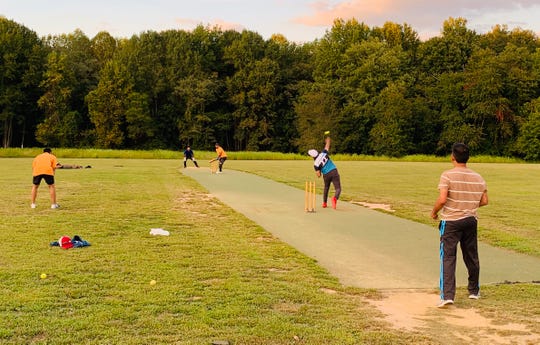
by blogadmin | Sep 23, 2019 | Blog Post, Delaware, Media Publishing's
On a summer weekend afternoon, Area 1 of Lums Pond State Park is in the throes of a ferocious cricket battle.
The grand climax of a match is at hand. In the right hand of the bowler at the north end is a ball; in the hands of the hunched batsman at the south end is a bat. And he is intently watching the bowler.
It might have been this batsman’s jutting backside that inspired Oscar Wilde to quip, “I never play cricket. It requires one to assume such indecent postures.”
The bowler starts to run as he delivers the last ball of the match. Suddenly there is pin-drop silence all around. Teams and their supporters become still — there isn’t even air moving through their noses.
The batsman’s mind is focused on scoring more than two runs off this ball. Only that will crown his team with a glorious victory, earning them a place in the coveted semifinals.
At least 100 cricket players visit Lums Pond every weekend during the season since two pitches were added in Area 3. It is time Delaware politicians took notice of the need and potential.
There are two cricket leagues at Lums Pond: The Delaware United Cricket League, which has been around for eight years, and the Delaware Premiere League, which is two years old. DUCL has 15 teams; DPL has 18.
DUCL’s season started in mid-April, and it held its semifinal matches last Saturday. On Sept. 21, at 11:30 a.m., the Lums Pond Cricket Club will face off against the Gujarat Lions in the semifinals. DPL’s season ended last weekend, when the Master Blasters defeated the Delaware Super Kings to claim the championship.
New cricket game formats are growing in popularity worldwide. The days of five-day-long test matches that often ended in a draw are long over.
Maybe George Bernard Shaw hastened their sunset when he said, “Baseball has the great advantage over cricket of being sooner ended.”
There’s a reason why cricket seems foreign to many Delawareans, says Paras Tiwari, captain of the DUCL’s defending champion team, the Lums Pond Cricket Club. The greater Philadelphia area has lost the passion for cricket that it had a century ago. These days, many think it is a game for minorities.
“All those who are playing here are those who were born, and also raised in most cases, in India, Pakistan, Bangladesh or Sri Lanka,” Tiwari says.
Cricket was introduced in that part of the world in the 1700s by the British. A distant cousin and forerunner of American baseball, it remains England’s national sport.
Some of Delaware’s cricket-crazy immigrants wish there was more local support in building interest in the sport.
“Why is cricket not introduced in schools?” asks Sunil Prashar, an all-round cricket veteran and DSK’s leading light. “Our own children — forget those who have no cricket in families — can’t learn the game without that.There is no academy in Delaware like in neighboring states. There is no indoor facility in Delaware like New Jersey has. That restricts the game to only a few months in a year.”
Major Minhas, who is one of DUCL’s main organizers, agreed that lack of facilities is a problem.
“We don’t have enough cricket pitches to play,” Minhas said. “One of the reasons why I supported Matt Meyer’s election was he promised one or more cricket pitches (cricket fields) in the county parks. But nothing so far.”
America has a closer history with cricket than you might think. Former President Ronald Reagan, who was “addicted” to cricket, thought it was “Buddhism made visible.” He was fond of using cricketing imagery and lingo.
“He also once said … that the most dangerous thing in the world, after Communism, was a rising ball outside the off-stump,” one former adviser was quoted as saying.
Cricket allowed Reagan to cozy up to Margaret Thatcher — unbeknownst to him, she knew a duck (zero in cricket) about cricket.
If you’re looking for something different, come and take in one of the cricket matches at Lums Pond. Perhaps you’ll even learn some of the sport’s terms that intrigued a former president: silly point, fine leg, short leg, slip, gully, googly, silly mid-on and silly mid-off, just to mention a few.
– – – – – – –
This column was published online by the www.delawareonline.com on September 19, 2019.
Also, published in Newspaper on September 21, 2019
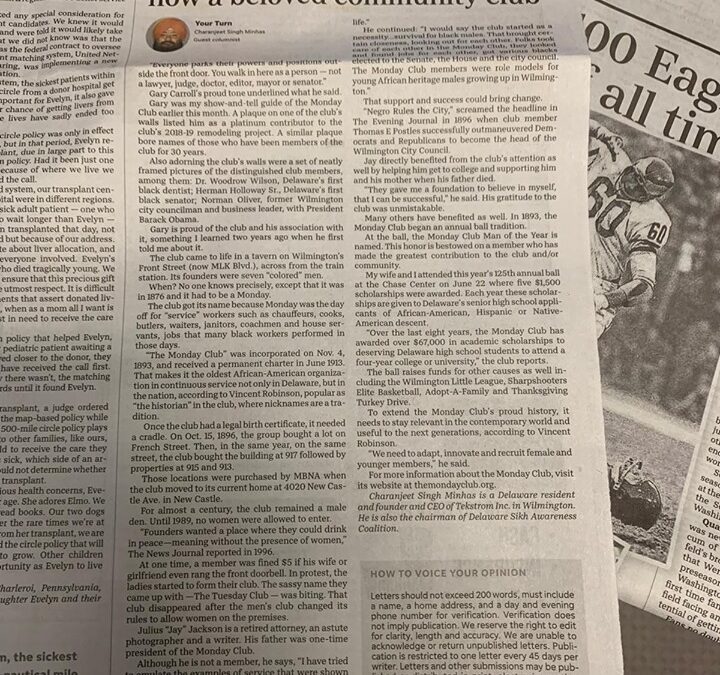
by blogadmin | Aug 12, 2019 | Blog Post, Delaware, Media Publishing's, Year 2019
“Everyone parks their powers and positions outside the front door. You walk in here as a person — not a lawyer, judge, doctor, editor, mayor or senator.”
Gary Carroll’s proud tone underlined what he said.
Gary was my show-and-tell guide of the Monday Club earlier this month. A plaque on one of the club’s walls listed him as a platinum contributor to the club’s 2018-19 remodeling project. A similar plaque bore names of those who have been members of the club for 30 years.
Also adorning the club’s walls were a set of neatly framed pictures of the distinguished club members, among them: Dr. Woodrow Wilson, Delaware’s first black dentist; Herman Holloway Sr., Delaware’s first black senator; Norman Oliver, former Wilmington city councilman and business leader, with President Barack Obama.
Gary is proud of the club and his association with it, something I learned two years ago when he first told me about it.
The club came to life in a tavern on Wilmington’s Front Street (now MLK Blvd.), across from the train station. Its founders were seven “colored” men.
When? No one knows precisely, except that it was in 1876 and it had to be a Monday.
The club got its name because Monday was the day off for “service” workers such as chauffeurs, cooks, butlers, waiters, janitors, coachmen and house servants, jobs that many black workers performed in those days.
“The Monday Club” was incorporated on Nov. 4, 1893, and received a permanent charter in June 1913. That makes it the oldest African-American organization in continuous service not only in Delaware, but in the nation, according to Vincent Robinson, popular as “the historian” in the club, where nicknames are a tradition.
Baltimore’s Arch Social Club earlier claimed the “most antique” tag until Vincent called them one day.
“Upon seeing the web page, I contacted the club and informed them of the Monday Club, Inc., and that their date of incorporation was 19 years later,” he said.
The Arch Social Club reacted to the news gracefully, Vincent said. A few weeks later it sent the Delaware club an invitation to visit, and eight members of The Monday Club drove to Baltimore for the fellowship opportunity.
Once the club had a legal birth certificate, it needed a cradle. On Oct. 15, 1896, the group bought a lot on French Street. Then, in the same year, on the same street, the club bought the building at 917 followed by properties at 915 and 913.
Those locations were purchased by MBNA when the club moved to its current home at 4020 New Castle Ave. in New Castle.
For almost a century, the club remained a male den. Until 1989, no women were allowed to enter.
“Founders wanted a place where they could drink in peace—meaning without the presence of women,” The News Journal reported in 1996.
At one time, a member was fined $5 if his wife or girlfriend even rang the front doorbell. In protest, the ladies started to form their club. The sassy name they came up with —The Tuesday Club — was biting. That club disappeared after the men’s club changed its rules to allow women on the premises.
Although women today remain frequent attendees, and even employees, there still are no females among the Monday Club’s 125 members.
Julius “Jay” Jackson is a retired attorney, an astute photographer and a writer. His father was one-time president of the Monday Club.
Although he is not a member, he says, “I have tried to emulate the examples of service that were shown to me by my father and other members of the club. I learned from an early age that I have an obligation to serve the community and make life better for others. I have tried to do this in my professional and personal life.”
He continued: “I would say the club started as a necessity…survival for black males. That brought certain closeness, looking out for each other. Folks took care of each other in the Monday Club, they looked and found jobs for each other, got various blacks elected to the Senate, the House and the city council. The Monday Club members were role models for young African heritage males growing up in Wilmington.”
That support and success could bring change.
“Negro Rules the City,” screamed the headline in The Evening Journal in 1896 when club member Thomas E Postles successfully outmaneuvered Democrats and Republicans to become the head of the Wilmington City Council.
Jay directly benefited from the club’s attention as well by helping him get to college and supporting him and his mother when his father died.
“They gave me a foundation to believe in myself, that I can be successful,” he said. His gratitude to the club was unmistakable.
Many others have benefited as well. In 1893, the Monday Club began an annual ball tradition.
At the ball, the Monday Club Man of the Year is named. This honor is bestowed on a member who has made the greatest contribution to the club and/or community.
My wife and I attended this year’s 125th annual ball at the Chase Center on June 22 where five $1,500 scholarships were awarded. Each year these scholarships are given to Delaware’s senior high school applicants of African-American, Hispanic or Native-American descent.
“Over the last eight years, the Monday Club has awarded over $67,000 in academic scholarships to deserving Delaware high school students to attend a four-year college or university,” the club reports.
The ball raises funds for other causes as well including the Wilmington Little League, Sharpshooters Elite Basketball, Adopt-A-Family and Thanksgiving Turkey Drive.
To extend the Monday Club’s proud history, it needs to stay relevant in the contemporary world and useful to the next generations, according to Vincent Robinson.
“We need to adapt, innovate and recruit female and younger members,” he said.
For more information about the Monday Club, visit its website at themondayclub.org.
– – – – –
This column was published online by the News Journal/Delawareonline.com on Monday, August 12, and printed in its Monday, August 12th edition.
Website Link: https://www.delawareonline.com/story/opinion/contributors/2019/08/12/opinion-once-refuge-black-men-now-beloved-community-club/1965620001/
Print Version:https://charanjeetsinghminhas.com/wp-content/uploads/2019/08/once_a_refge.jpg
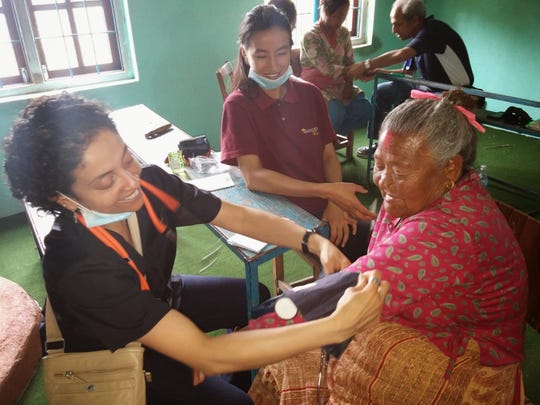
by blogadmin | Jul 5, 2019 | Blog Post, Delaware, Media Publishing's, Year 2019
“What do you think of doctors?” I have been asked.
“A heartless tribe of professionals experienced in focusing on your wealth while pretending to care for your health,” has been my reply.
But one of the physicians here in Delaware changed my mind.
I have observed him closely for years. He and his wife are both internists in Wilmington and practice under Trinity Medical Associates.
His name is Vinod Kripalu, MD, but everyone calls him Vinny. She is Chetana Kripalu, MD, and everyone calls her that.
Vinny could be mistaken for a famine victim with his frail frame. But his meager physique is not the result of poor nutrition, just a seemingly inexhaustible energy. An avid runner, last December he kept going for over 26 hours until the 100-mile mark finally stopped him.
The Kripalus’ devotion and dedication to helping and serving the needy, however, is unstoppable.
In 2006, Vinny organized his first visible philanthropic effort through a “Brick by Brick” fundraiser. The twelve thousand dollars it raised were used to build a school in Kenya. In 2008, he and Chetana provided their services on a medical mission to Jamaica.
He also established two nonprofit organizations he still serves — the Delaware Medical Relief Team (DMRT) and Premiere Charities Inc. (PCI).
The medical relief team was created in 2009 after an earthquake devastated Haiti.
“We were the first team to go within a few days of the earthquake. DMRT sent out seven teams after Haiti and five after the Nepal earthquake,” he told me.
Their service also helps those closer to home. Each Sunday, rain or shine, From Our Kitchen, a program of PCI, provides food to the homeless and needy at Front and Lombard in Wilmington. The organization feeds about 180 people in each service and has provided more than 80,000 meals since 2009.
PCI has raised more than half a million dollars over the years and contributed each cent to several relevant local and global causes such as the fund for families of deceased local firefighters, help for families affected by diseases such as breast cancer, and aid for victims of a Pakistan earthquake.
I was among those who attended PCI’s fundraiser gala in April at The Waterfall banquet hall in Claymont. I watched in amazement and admiration as Vinny’s father, 93-year-old father, Thirumalachar Kripalu, danced with his daughter-in-law, Chetana.
Curious about the Kripalus’ impulse to help, I reached out to Thirumalachar to trace his son’s roots.
“I had a very tough childhood,” said Kripalu, a retired Indian army brigadier. “We were extremely poor, had nothing. Existence was becoming tough. As a kid, I started begging to earn something and would give it to my mom. This habit of sharing with others became a satisfying habit.”
Kripalu continued: “I was a major posted in the UK when Vinny was born there in 1964. I cannot say whether I influenced him, but one thing is certain: Chetana has a lot to do with his giving. She wanted to serve the needy even more.”
In August of 2015, Chetana and her daughter, Meera, along with Meera’s friend, Hannah, and a nurse traveled to Nicaragua to establish a health clinic.
“Chetana was the only doctor and worked long hours daily at the clinic in Pantanal, one of the poorest barrios in Nicaragua,” according to Chuck Selvaggio, executive director of Neighbors to Nicaragua, a Wilmington nonprofit. Meanwhile, Meera and Hannah volunteered at a nearby school, working with and feeding the children.
“Both Chetana and Vinny have been very supportive of our work, contributing time, financial support (paying for many of the medications given out at the clinic), and, most of all, encouragement and inspiration by example in the great work they do and the wonderful people they are,” Selvaggio said “Their lives are nothing less than a great gift to our community and all the people they serve worldwide.”
It takes a long time, lots of fortitude and some luck to succeed in doing good. Not many doctors like Vinny and Chetana envision “state of complete wellbeing” for their patients by “nurturing their body, mind, and spirit.”
It is fitting that their work reflects the meaning of their Indian names. In the case of Vinny and Chetana, their first names mean happiness (Vinod) and consciousness (Chetana). Kripalu means indulgent.
Maybe that’s why they are happily and consciously indulgent!
– – – – – – –
This column was published online by the www.delawareonline.com on July 03, 2019.
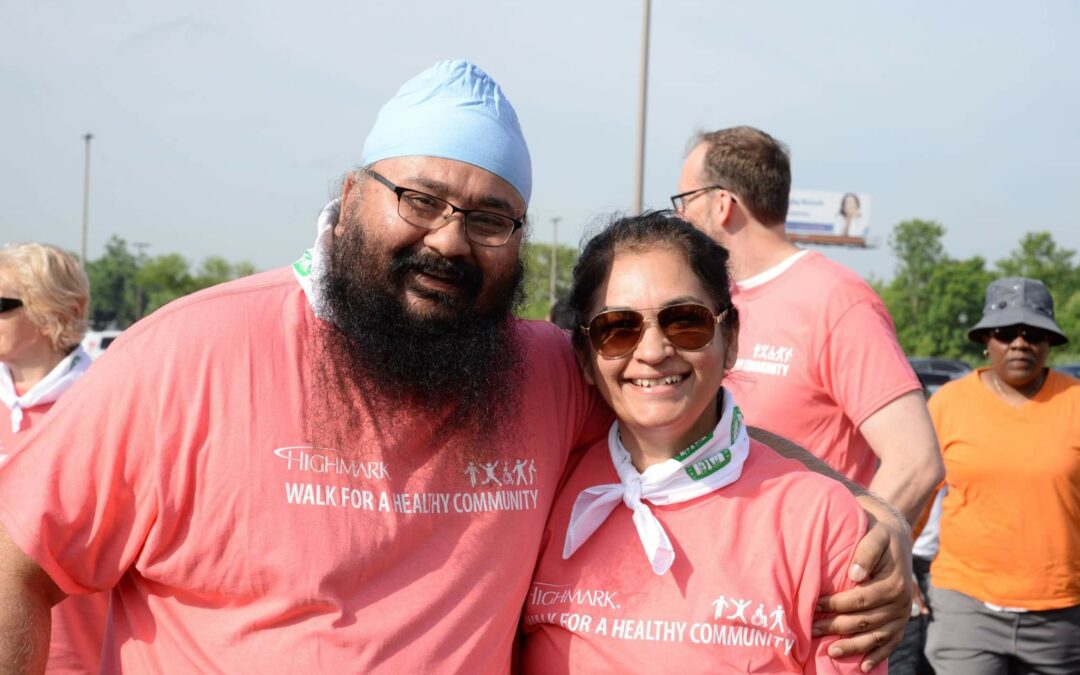
by blogadmin | Jun 13, 2019 | Delaware, Year 2019
Last Saturday, June 8th, introduced itself with a beautiful morning. Walkers and volunteers gathered in Wilmington’s Dawn Frawley stadium sported wide and warm smiles. Maybe they knew the joy ahead in walking the new scenic trail. For Renu and I, it was our first experience participating in Highmark Community Walk. I am glad we did it!

by blogadmin | Jun 4, 2019 | Delaware, Year 2019
Eid Mubarak everyone!
The recent Ramadan month was great not only because of the five interfaith Iftars I attended—including the one I hosted—and my apparent love for food. Also, because it gives people of other faith traditions a platform, an opportunity, to know Islam and the Muslims, dispelling in the process misunderstandings surrounding both.
What happens as a result is that non-Muslims like these two become admirers of the faith and its followers.
First, Kunwar Mohinder Singh Bedi “Sahar” (a descendant of Guru Nanak’s family), an eminent Urdu poet, famous for many ghazals (aaye hain samjhane log), said this about Islam:
Ishq ho jaye kisi se koi chara to nahi
Sirf Muslim ka Mohammed pe izara to nahi
(When you fall in love with someone what can you do
Only Muslim doesn’t have exclusivity over Mohammed)
Who needs introduction to Khushwant Singh. He was a man of many turbans: humorist, writer, journalist, satirist, syndicated columnist for 40 years, and lover of wine and women. However, he was equally renowned for his love of Pakistanis. He met none without appointment but Pakistanis.
Celebrate Eid
Celebrate Peace
Celebrate Fellowship
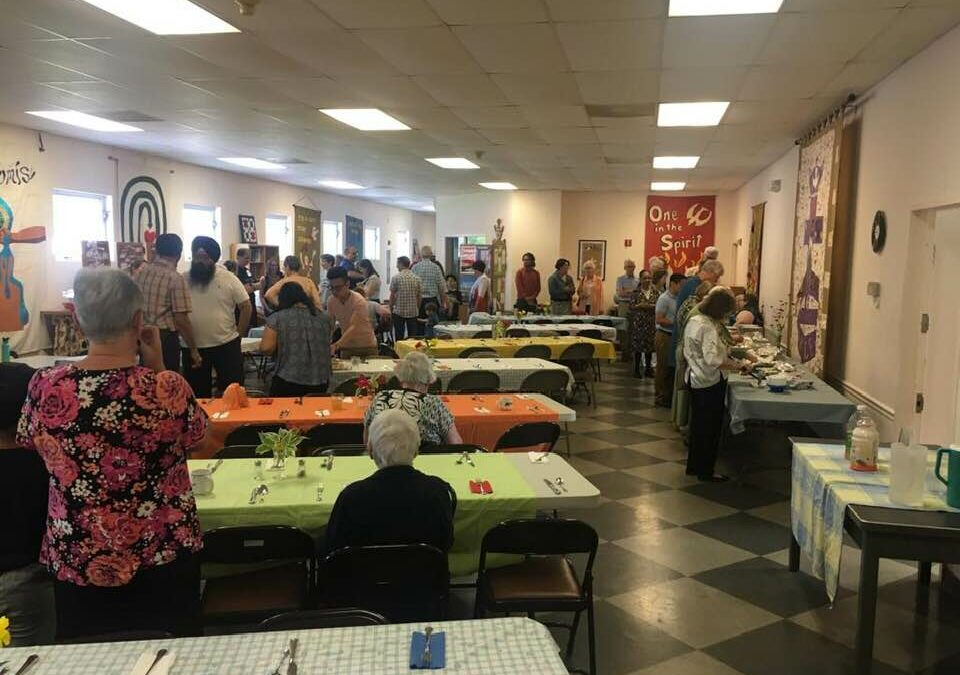
by blogadmin | Jun 3, 2019 | Delaware, DSAC, Sikhism, Year 2019
“Vand chako” (share before you consume) is one of the values Guru Nanak Dev (founder of Sikhism or Sikhi) emphatically taught. Delaware Sikh Awareness Coalition (DSAC) is grateful to New Ark United Church of Christ for the opportunity today to serve them langar (complimentary communal meal) in commemoration of Guru Nanak’s 550th birth anniversary year. What a joyous experience it was!
Please let us know if we can do langar or another kind of service for your congregation or house of worship.







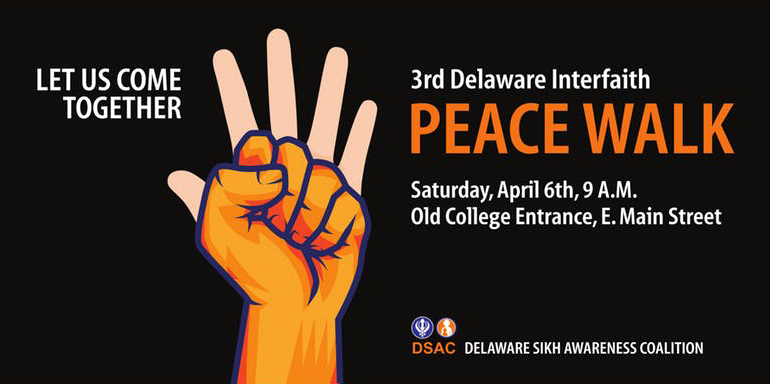
Recent Comments